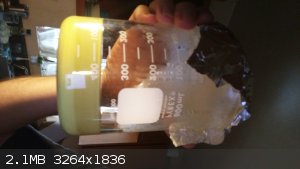The Austrian Scientist
Harmless

Posts: 30
Registered: 1-1-2018
Location: Austria
Member Is Offline
Mood: Analytical
|
|
Fe oxalate complexes
Hi,
does anyone have experience with iron oxalate complexes like
[Fe(C2O4)3]2- or [Fe(C2O4)2]2-?
[Edited on 2-1-2018 by The Austrian Scientist]
|
|
|
j_sum1
Administrator
       
Posts: 6333
Registered: 4-10-2014
Location: At home
Member Is Offline
Mood: Most of the ducks are in a row
|
|
Well, FeC2O4 is highly insoluble and getting it to do anything except precipitate might be difficult. I doubt you coUKld form a complex with excess
oxalate.
And the first compound you suggested, [Fe(C2O4)3]2- has iron in a +4 oxidation state. I don't think you will find that stable.
Care to give some context as to why you are asking the question?
|
|
|
The Austrian Scientist
Harmless

Posts: 30
Registered: 1-1-2018
Location: Austria
Member Is Offline
Mood: Analytical
|
|
Sorry, I meant [Fe(C2O4)3]3-
I want to explore the chemistry of these complexes and prepare salts with different metals.
|
|
|
mayko
International Hazard
    
Posts: 1218
Registered: 17-1-2013
Location: Carrboro, NC
Member Is Offline
Mood: anomalous (Euclid class)
|
|
I've made some ammonia complexes of misc. transition metal oxalates. Iron oxalate seems to be very prone to oxidation under basic conditions though,
and I've never been able to isolate this complex.

al-khemie is not a terrorist organization
"Chemicals, chemicals... I need chemicals!" - George Hayduke
"Wubbalubba dub-dub!" - Rick Sanchez
|
|
|
The Austrian Scientist
Harmless

Posts: 30
Registered: 1-1-2018
Location: Austria
Member Is Offline
Mood: Analytical
|
|
I hope this doen´t bother me, since i am not working in an basic environment.
|
|
|
happyfooddance
National Hazard
   
Posts: 530
Registered: 9-11-2017
Location: Los Angeles, Ca.
Member Is Offline
Mood: No Mood
|
|
If you have soluble ferrous salts, it's as easy as adding oxalic acid, and heating/stirring, and filtering the precipitate.
Edit: Polverone's suggestion on this page http://www.sciencemadness.org/talk/viewthread.php?tid=18418 works well, I made a bunch of iron (II) oxalate recently using this method.

[Edited on 1-2-2018 by happyfooddance]
|
|
|
The Austrian Scientist
Harmless

Posts: 30
Registered: 1-1-2018
Location: Austria
Member Is Offline
Mood: Analytical
|
|
But this precipitats FeC2O4 * 2 H2O(wich i have already made), but i want to complex it wit a nother oxalate ion to optain the [Fe(C2O4)2]2- complex.
Thanks thoug.
[Edited on 2-1-2018 by The Austrian Scientist]
|
|
|
happyfooddance
National Hazard
   
Posts: 530
Registered: 9-11-2017
Location: Los Angeles, Ca.
Member Is Offline
Mood: No Mood
|
|
Oh, my bad
|
|
|
elementcollector1
International Hazard
    
Posts: 2684
Registered: 28-12-2011
Location: The Known Universe
Member Is Offline
Mood: Molten
|
|
Complexing it to the trioxalatoferro ion is as simple as adding hydrogen peroxide and an excess of oxalic acid. You should see the liquid above the
solution turn a vivid, radioactive yellow-green.
Elements Collected:52/87
Latest Acquired: Cl
Next in Line: Nd
|
|
|
happyfooddance
National Hazard
   
Posts: 530
Registered: 9-11-2017
Location: Los Angeles, Ca.
Member Is Offline
Mood: No Mood
|
|
Quote: Originally posted by elementcollector1  | | Complexing it to the trioxalatoferro ion is as simple as adding hydrogen peroxide and an excess of oxalic acid. You should see the liquid above the
solution turn a vivid, radioactive yellow-green. |
I have done this, but how do you isolate the solid? Just boil off the liquid? I tried evaporating this solution, I was getting black junk.
|
|
|
DraconicAcid
International Hazard
    
Posts: 4355
Registered: 1-2-2013
Location: The tiniest college campus ever....
Member Is Offline
Mood: Semi-victorious.
|
|
The complex is photosensitive. If you make it in concentrated enough solution, it should crystallize nicely upon cooling.
Please remember: "Filtrate" is not a verb.
Write up your lab reports the way your instructor wants them, not the way your ex-instructor wants them.
|
|
|
The Austrian Scientist
Harmless

Posts: 30
Registered: 1-1-2018
Location: Austria
Member Is Offline
Mood: Analytical
|
|
Thanks for the support.
The Trioxalatoferrate thoug i plan to prepare by adding
(NH4)2C2O4 to a FeCl3 solution.
FeCl3 + 3 (NH4)2C2O4 -> (NH4)3[Fe(C2O4)3] + 3 NH4Cl
The FeC2O4 * 2 H2O is for the dioxalatoferrate(II)
|
|
|